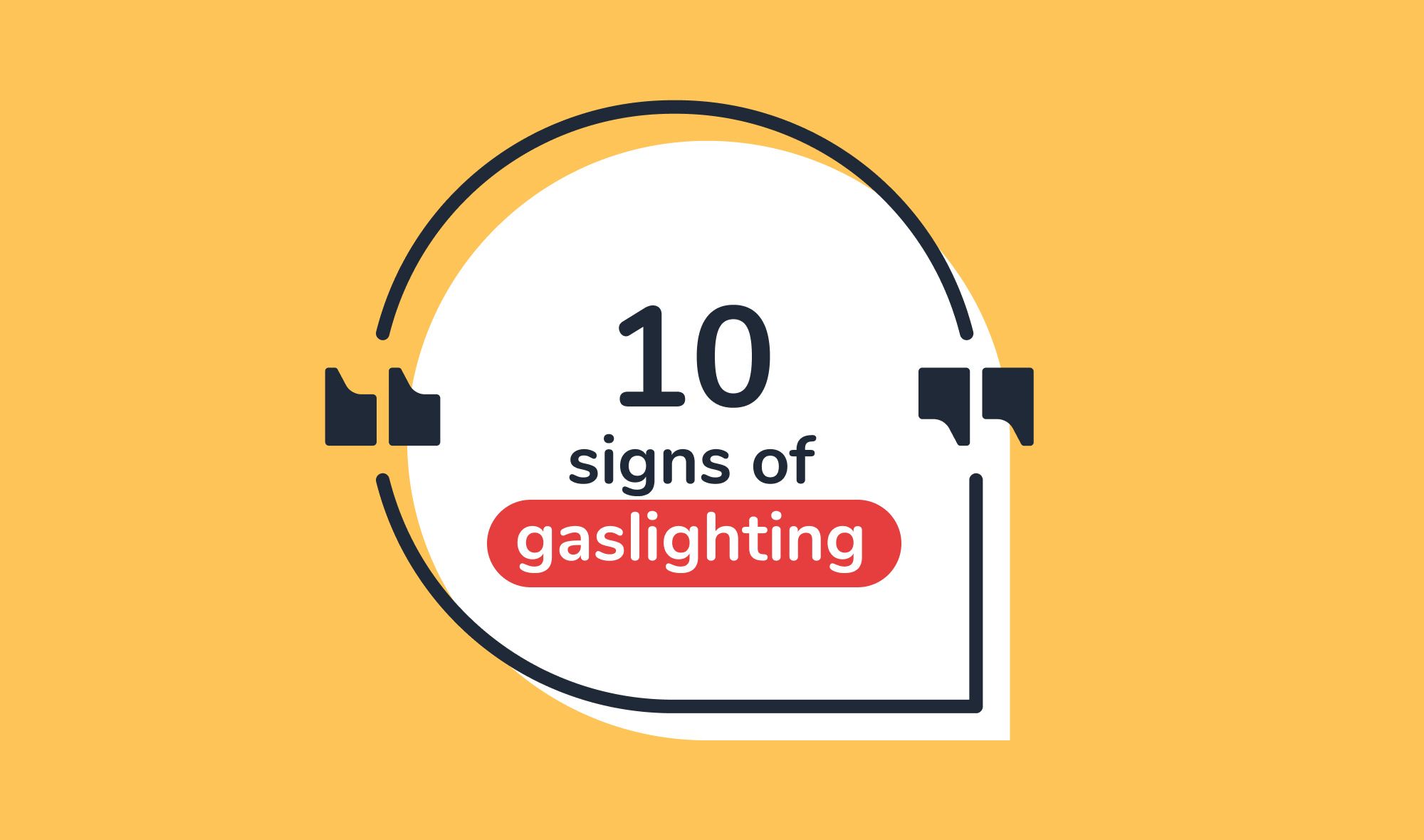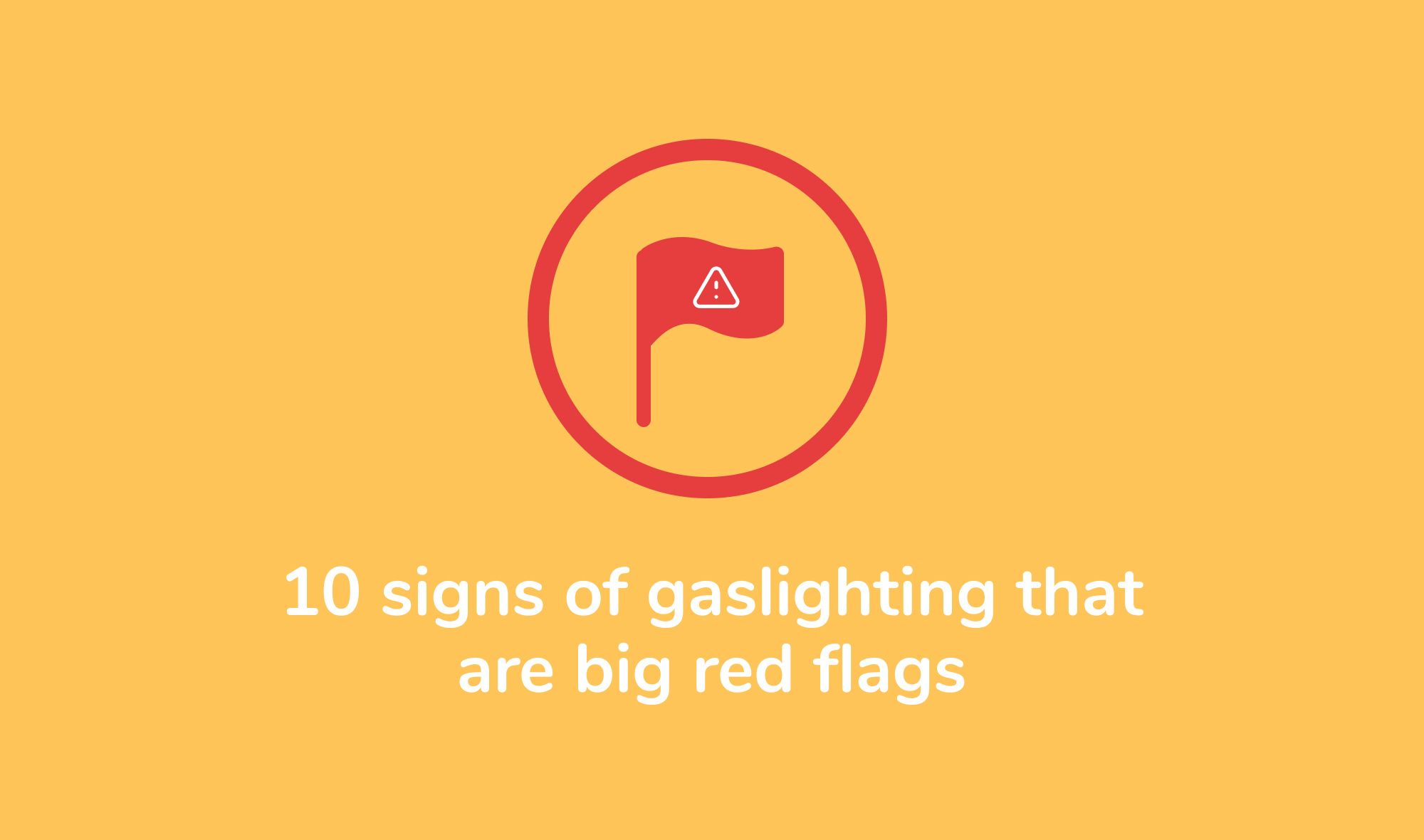10 signs of gaslighting: how to recognize and respond to emotional abuse
By Remy Meraz • March 23, 2023

Emotionally abusive relationships have become more prevalent in recent years, thanks in part to the rise of technology and social media, which can create new avenues for abusers to control and manipulate their victims. Emotional abuse can take many forms, one of the most common and insidious forms being gaslighting.
Victims of gaslighting often feel like they are going crazy or losing their grip on reality. They may also feel like they can't trust their own big ego, thoughts and feelings, which can lead to depression, anxiety, and other mental and emotional health problems. The good news is by teaching people about the warning signs of emotional abuse and how to recognize them, we can empower them to take action and protect themselves.
In this blog post, we will explore the 10 signs of gaslighting and provide guidance on how to recognize and respond to this form of emotional abuse. By understanding the signs of gaslighting, you can take steps to protect yourself and reclaim your sense of self-worth.
Join our Newsletter
Transform your career with our personal growth insights. Get one valuable tip right in your inbox every Saturday morning.
Definition of gaslighting

Gaslighting is a tactic used by abusers to manipulate their victims into doubting their own perceptions, memories, and sanity. The term originated from the 1938 play "Gas Light" by Patrick Hamilton, which was later adapted into a film in 1944. The story revolves around a husband who manipulates his wife into thinking she is losing her mind by dimming the gas lights in their home and denying it when she confronts him about it. Over time, the wife begins to doubt her own sanity and perception of reality.
Today, gaslighting is a well-known and recognized form of emotional abuse. Abusers may use gaslighting tactics to control their victims and make them feel helpless and isolated. Gaslighting can take many forms, including denying the victim's experiences, emotions, and perceptions, twisting the truth to make the victim doubt their own memory and shifting blame onto the victim. The goal of gaslighting is to undermine the victim's sense of self-worth and reality, making it easier for the abuser to control them.
Intentional vs unintentional gaslighting

Gaslighting can be intentional or unintentional, and the difference between the two is important to understand.
Intentional gaslighting is a deliberate attempt to manipulate and control someone by making them doubt their own perceptions and reality. The gaslighter may do this to gain power over their victim or to avoid taking responsibility for their actions. Intentional gaslighting can be a tactic used by abusers to control their victims and maintain power in the relationship.
Unintentional gaslighting, on the other hand, may occur without the gaslighter even realizing it. This can happen when someone has a different perception of reality or memory of events than the person they are communicating with. For example, a friend may remember a past event differently than you do, and inadvertently make you doubt your own memory of the event.
It's important to note that unintentional gaslighting can still be harmful to the person on the receiving end. Even if the gaslighter doesn't intend to manipulate or control, the effect can still be the same, causing confusion and self-doubt in the victim.
10 signs of gaslighting that are big red flags

Gaslighting can happen in any type of relationship, from romantic partnerships to friendships and even in professional settings. It is a particularly insidious form of emotional abuse because it can be difficult to recognize. Victims may not even realize that they are being gaslit, and instead, may believe that their confusion and self-doubt are a result of their own shortcomings.
Recognizing the signs of gaslighting is the first step in combatting this form of emotional abuse. By educating ourselves and others about the warning signs, we can empower ourselves to take action and protect ourselves from gaslighting tactics.
Sign #1: The person denies your reality

One of the key signs of gaslighting is when the gaslighter denies things that happened or denies saying things that they did say. This can be incredibly confusing and disorienting for the victim, as it makes them doubt their own perceptions and memory.
For example, if you confront a gaslighter about something they did that hurt you, they may tell you that it never happened, or that you are remembering it wrong. If you suspect that someone is gaslighting you by denying things that happened or denying things that they said, there are a few things to look out for. First, pay attention to your own memory and perception of events. If you remember something happening a certain way, but the gaslighter is telling you that it never happened or happened differently, trust your own memory and perception.
Sign #2: They use lies and confusion to make you doubt yourself
A gaslighter may use blatant lies and confusion to make you doubt your own behavior or perceptions. They may tell you something that contradicts what they said earlier, causing you to question what is true. For example, a gaslighter may tell a friend they will pick them up from the airport at a certain time, but then later deny ever making that promise, causing the friend to question their own perception of the situation.
This type of emotional manipulation is not uncommon in a gaslighting relationship. Imagine a scenario where a gaslighter, let's call him Tom, is in a relationship with his partner, Emily. One day, Emily confronts Tom about something hurtful that he said to her the night before.
Tom responds by telling Emily that he never said those things and that she is imagining it. Emily begins to doubt her own memory of events, wondering if she truly did hear Tom say those hurtful things. Tom continues to deny ever saying those things, causing Emily to question her own sanity and reality.
The next day, Tom tells Emily that he never said he didn't say those things and that she is overreacting. Emily becomes even more confused and begins to doubt her own perception of events. Over time, Tom continues to use these tactics to manipulate Emily, causing her to feel powerless and confused.
Sign #3: They trivialize your feelings
Another way gaslighters achieve control over their victim is by minimizing or dismissing the victim's emotions. This can be incredibly damaging, as it invalidates the victim's feelings and can make them doubt their own emotional responses.
For example, a family member may tell their child that they are being too sensitive when the child expresses fear or sadness about a situation. This can cause the child to suppress their emotions and begin to doubt their own emotional responses.
In a professional setting, a coworker may dismiss a colleague's frustration about a work situation, telling them that they are overreacting or being too emotional. This can cause the colleague to doubt their own emotions and begin to question whether their reactions are appropriate. Managerial roles also apply to this, learn more about their roles to get to know more on their roles to identify.
Sign #4: They use isolation as a tactic

A gaslighter may try to isolate you from friends and family, making you more dependent on them. Gaslighting and isolation are closely tied to narcissistic personality disorder (NPD). NPD is a personality disorder characterized by a pervasive pattern of grandiosity, a lack of empathy, and a need for admiration. Narcissists often use gaslighting and isolation to control their victims and maintain their sense of power and superiority.
They may also try to cut you off from other sources of information, making it easier to control your perceptions and beliefs. This often includes cutting their partner off from communication with the outside world, such as by confiscating their phone or preventing them from accessing social media. When a victim of gaslighting becomes so isolated that they have no one and nothing to compare their abusive partner to, it makes it even easier for the abuser to continue the vicious cycle.
Sign #5: They project their flaws onto you
Another classic sign of gas lighting is projecting their own flaws and insecurities onto you. For example, if they are being unfaithful, they may accuse you of cheating on them, making the partner feel as if they are the problem, rather than the gaslighter. Within a family, a parent may accuse their child of being lazy when the parent themselves struggle with motivation and productivity. This can make the child feel as if they are inherently flawed, rather than recognizing that everyone has strengths and weaknesses.
In both of these examples, the gaslighter is projecting their own inadequacies onto their victim in order to maintain their sense of power and control. This behavior can be incredibly damaging, as it can make the victim feel as if they are somehow responsible for the gaslighter's behavior.
Sign #6: They use your vulnerabilities against you
When a gaslighter is aware of someone's vulnerabilities or insecurities, they can use them to gain power and control over their victim. By making negative comments about their appearance or other vulnerabilities, the gaslighter can make the victim feel worse about themselves and more dependent on the abuser. This can make it harder for the victim to leave the abusive relationship.
Here are some common types of vulnerabilities that gaslighters may exploit:
Low self-esteem:
Gaslighters may make negative comments about the victim's appearance, intelligence, or abilities to undermine their self-esteem.
Trauma:
Victims who have experienced trauma may be more vulnerable to gaslighting as they may already have difficulties trusting their own perception of reality.
Isolation:
Gaslighters may isolate their victim from friends and family, making them more dependent on the abuser and easier to manipulate.
Financial dependence:
Gaslighters may use financial dependence to control their victim's behavior, making it harder for them to leave the relationship.
Mental health issues:
People with mental health issues may be more vulnerable to gaslighting as they may already have difficulties with their perception of reality.
Sign #7: They twist your words and manipulate conversations

When a gaslighter twists the victim's words or manipulates conversations, it can lead to a loss of self-confidence, anxiety, and even depression. Over time, this abusive pattern can contribute to the development of antisocial personality disorder in the gaslighter.
Antisocial personality disorder (ASPD) is a mental health condition characterized by a persistent disregard for the rights of others. People with ASPD may engage in manipulative behavior to get what they want, even if it harms others. They may also lie, cheat, and steal without feeling guilt or remorse.
Gaslighting behavior is a common feature of ASPD. When a gaslighter twists the victim's words or manipulates conversations, they are engaging in manipulative behavior that serves to control the victim. Over time, this pattern of behavior can become habitual, leading to the development of ASPD.
Join our Newsletter
Transform your career with our personal growth insights. Get one valuable tip right in your inbox every Saturday morning.
Gaslighters may use a variety of tactics to manipulate conversations and twist words. For example, they may:
- Change the subject when confronted with their behavior.
- Use sarcasm or passive-aggressive comments to undermine the victim's confidence.
- Use charm or flattery to manipulate the victim's emotions.
Sign #8: They create a sense of uncertainty
In a new relationship, a gaslighter may create a sense of uncertainty by establishing one set of rules at the beginning of the relationship, only to change them without warning later on. For example, they may say that they are comfortable with their partner spending time with friends of the opposite sex, only to become jealous and controlling when their partner actually does so. They may do this to gain power and control over their partner by making it difficult for them to know what to expect or how to behave.
Another example could be expecting their partner to be available at all times, even during work or other commitments. When the partner tries to set boundaries or assert their needs, the gaslighter may accuse them of being selfish or uncaring. Additionally, gaslighters may use guilt trips to create a sense of uncertainty and anxiety in the partner, who may feel like they are always walking on eggshells.
Sign #9: They use occasional positive reinforcement to keep you hooked
A gaslighter may use occasional positive reinforcement to keep you hooked and maintain control over the relationship. Positive reinforcement refers to providing rewards or benefits to encourage certain behaviors. In the context of gaslighting, this may involve:
Love bombing:
In the early stages of the relationship, gaslighters may use love bombing to overwhelm their partner with attention and affection. This may include excessive texting, gifts, and physical affection. By doing so, the gaslighter creates a sense of attachment and dependence in the victim.
Praise and validation:
Gaslighters may use praise and validation to reinforce their victim's compliance. For example, they may praise their partner for doing something that they want or validate their opinions to make them feel heard and understood.
Rewards and gifts:
Gaslighters may use rewards and gifts to reinforce their partner's behavior. For example, they may promise to take their partner on a vacation or buy them a gift if they comply with their demands.
Intermittent reinforcement:
Gaslighters may use intermittent reinforcement to keep their victim hooked on the relationship. This involves providing rewards or benefits on an inconsistent basis, which creates a sense of unpredictability and excitement. For example, the gaslighter may alternate between affection and criticism to keep their partner guessing and off-balance.
These positive reinforcement tactics can create a sense of attachment and dependence in the victim, making it harder for them to leave the relationship.
Sign #10: They make you feel like you're going crazy
A gaslighter may make you feel like you are losing your mind by denying things that you know to be true or manipulating your perceptions and beliefs. You may begin to doubt your own memory and judgment, leading to confusion and self-doubt.
Here are some common phrases that a gaslighter may use to make their victim question their own reality:
"You're imagining things"
When a gaslighter denies things that the victim knows to be true, they may use this phrase to make the victim doubt their own memory or perception of reality.
"You're too sensitive"
Gaslighters often minimize the victim's feelings, making them feel like their emotions are invalid or overblown. This can make the victim question their own reactions and feel like they are being overly sensitive or irrational. For more information on gaslighting, please see our blog post on unveiling the dark art of gaslighting.
"I never said that"
Gaslighters may deny things that they have said or done, causing the victim to question their own memory and perception of events. This can create confusion and self-doubt in the victim.
"You're crazy"
Gaslighters may use this phrase to make the victim feel like their thoughts and emotions are invalid or irrational. This can make the victim question their own judgment and feel like they are losing their mind.
"You're always wrong"
Gaslighters may consistently undermine the victim's confidence by criticizing their ideas or decisions. This can make the victim feel like they are always wrong, leading to self-doubt and a lack of confidence.
How do you know someone is gaslighting you?

You start to question simple decisions in your relationship
Gaslighters may create confusion and doubt by changing the rules or expectations without warning. This can make it hard for you to know what to expect or how to behave, leading to uncertainty and self-doubt.
You are constantly feeling insecure
Gaslighters may use criticism or belittlement to undermine your self-esteem, making you feel unworthy or inadequate. This can create feelings of insecurity and doubt.
You start to wonder if you are too sensitive
Gaslighters often minimize the victim's feelings, making them feel like their emotions are invalid or overblown. This can make you question your own reactions and feel like you are being overly sensitive or irrational.
You are constantly reviewing your actions
Gaslighters may use guilt trips or blame-shifting to make you feel responsible for their behavior. This can make you second-guess your own actions and feel like you are always in the wrong.
You begin to question your judgment and perceptions
Gaslighters may deny things that you know to be true or manipulate your perceptions and beliefs. This can make you doubt your own memory and judgment, leading to confusion and self-doubt.
You are genuinely confused
Gaslighters may use a variety of tactics to manipulate your perceptions and beliefs, causing confusion and disorientation. You may feel like you are losing your grip on reality, leading to anxiety and isolation.
How to stop psychological abuse in a relationship

Stopping psychological abuse in a relationship can be challenging because it often involves manipulation, control, and emotional dependency. Victims of psychological abuse may feel trapped or powerless to leave the relationship, especially if the abuser has made them doubt their own judgment and perception of reality. However, it's important to take steps to stop the abuse, as it can have serious consequences for your well-being and safety.
Identify the behavior
Recognizing the signs of psychological abuse is the first step to stopping it. Psychological abuse can take many forms, and identifying gaslighting behavior can be difficult, as it often involves subtle manipulation and psychological manipulation. However, there are some signs that you can look for that may indicate that you are being gaslit.
If something feels off or doesn't seem right, trust your instincts. Gaslighting often involves the abuser making you doubt your own perceptions of reality, so it's important to trust your gut. Additionally, gaslighting can cause you to feel confused, anxious, or insecure. If you find yourself feeling this way around a certain person, it may be a sign that they are gaslighting you.
Look for inconsistencies in the person's behavior and statements, such as changing their story often or denying things that you know to be true. Keeping a journal or documenting your experiences can help you identify patterns of gaslighting behavior. Write down what happened, how you felt, and how the other person responded.
Establish boundaries
Setting clear boundaries is an important step in stopping psychological abuse in a relationship. Boundaries are limits that you set for yourself and communicate to others about what you are willing and not willing to tolerate in a healthy relationship.
Here are some tips for setting clear boundaries:
Be clear and specific:
When setting boundaries, it's important to be clear and specific about what behaviors you will and will not tolerate. For example, you can let your partner know that you will not accept name-calling or yelling and that such behavior is not acceptable in your relationship.
Communicate your boundaries:
Once you have identified your boundaries, communicate them clearly to your partner. This can involve having an honest conversation about your needs and expectations in the relationship.
Enforce your boundaries:
It's important to enforce your boundaries consistently and assertively. If your partner violates your boundaries, communicate your disappointment and let them know that such behavior is not acceptable.
Be willing to compromise:
While it's important to set clear boundaries, it's also important to be willing to compromise and negotiate with your partner. This can involve finding a middle ground that works for both of you.
Seek support from trusted friends or professionals
If you are experiencing gaslighting, it is important to seek help. There are many resources available to help you cope with the emotional abuse and to find ways to move on with your life. One such resource is our blog post on how to find life balance in 10 simple steps.
It's important to note that stopping psychological abuse may require outside professional help, such as from a therapist, counselor, life coach, or support group. These resources can provide guidance on how to recognize abusive behavior, develop coping strategies, and create a safety plan.
It's also important to have a support system of trusted friends or family members who can provide emotional support and help you make decisions about your relationship.
Consider ending the relationship if the behavior doesn't stop
Ultimately, stopping psychological abuse may require leaving the relationship if the abuser refuses to change their behavior or if the abuse continues despite your efforts to stop it. This can be a difficult decision, but it's important to prioritize your own well-being and safety.
Remember, you deserve to be treated with respect and dignity in your relationship, and there is help available to you if you are experiencing psychological abuse.
If you are ready to take steps to become the best version of yourself, check out our blog post "Be the Best Version of You: 11 Tips for Living Your Best Life" for more information.
Conclusion
Gaslighting is one of the most dangerous forms of emotional abuse and can be extremely destructive to someone's mental well-being. It involves manipulating someone's perception of reality, often causing them to question their own judgment, memory, and sanity. Gaslighting can cause immense confusion, anxiety, and insecurity, leaving victims feeling isolated and helpless.
If you suspect that you are being gaslit, it's important to set clear boundaries with your partner, seek support from trusted friends or professionals, and consider ending the relationship if the abuse continues. Remember that gaslighting can have serious consequences for your mental well-being and can lead to a range of negative outcomes, including anxiety, depression, and low self-esteem. However, by taking action to stop gaslighting, you can protect your emotional well-being and regain your sense of self.
Join our Newsletter
Transform your career with our personal growth insights. Get one valuable tip right in your inbox every Saturday morning.
Read more about: Life Coaching, Healthy Relationships
About Remy Meraz
Remy Meraz, co-founder, and CEO of Zella Life, is a visionary leader who leveraged corporate glass ceiling challenges as a woman of color to drive systemic change.
While leading and cultivating high-performance teams from VC-backed startups to Fortune 500, she consistently faced obstacles such as inadequate mentorship, lack of psychological safety, and non-personalized training. Taking matters into her own hands, she turned to executive coaching and NLP training. This life-changing growth experience led to breaking leadership barriers and a passion for cognitive psychology.
Motivated by her experiences, she co-founded Zella Life, an innovative AI-driven coaching platform bridging the talent development gap by enhancing soft skills and emotional intelligence (EQ) in the workplace.
Her vision with Zella Life is to transform professional development into an inclusive and impactful journey, focused on the distinct needs of both individuals and organizations. She aims to promote advancement and culture change by ensuring every professional's growth is acknowledged and supported.
Today, Remy is recognized as an influential innovator, trainer, mentor, and business leader. Under her leadership, Zella Life has delivered significant measurable outcomes for numerous well-known brands. This track record of positive outcomes garnered attention and funding from Google for Startups and Pledge LA, establishing Zella Life as a pivotal force in the learning and development arena tackling and resolving fundamental talent development issues for organizations of all sizes.